When it pertains to shared holding firms, DreamHostand HostGatorhave actually been around for a long period of time. There are individuals that will advocate one or the various other– yet that’s actually the most effective?
In order to respond to that concern, we took each host and placed them versus each various other over the duration of a year and gathered a selection of unbiased information on rate, web server efficiency, and various other crucial metrics. We’ve been constructing and evaluating web sites for over 15 years and have actually made use of each host thoroughly, so we have a several points to claim (both great and negative) regarding every one.
The function of this web page is to give clear, unbiased (and subjective) details concerning DreamHost and HostGator that might assist you identify which host is best for your scenario. There’s no solitary finest host for everybody, so it’s truly an issue of identifying what your demands are and afterwards taking a look at what a host needs to supply in regards to attributes, rates, dependability, efficiency, and a lot more. The objective of this web page is to take a look at the concern of DreamHostvs HostGator and existing info that might assist you make a notified choice.
Complete and uncomplicated disclosure: if you wind up buying holding from DreamHost or HostGatormaking use of several of the web links that we’ve supplied on this specific web page (and others on this website), we could get a tiny compensation for the reference. In some scenarios, we may not relying on the strategy you buy and a range of various other elements. It does not set you back any longer to buy from among these web links and assists to sustain the web content of this website. It’s crucial to us that you comprehend that our evaluations and suggestions aren’t based upon payments in any way– as a matter of fact, we clearly inform individuals to steer clear of from a couple of webhosting that pay really high recommendation compensations (you can find out more regarding that below).
Since the intro mores than with, allow’s look closer take a look at DreamHost and HostGator to see which host triumphes!
HostGator vs DreamHost: The Evaluation Criteria
When doing any type of sort of contrast, it’s crucial to have a conventional collection of standards in order to make a reasonable contrast. We’ve discovered that there are 5 main assessment metrics that function well to assist to repaint a reasonable and full photo of a host. The complying with are the metrics that will certainly be utilized to contrast and comparison HostGatorand DreamHost:
- Server Performance and Page Load Speed
- Uptime/Downtime
- Consumer Support
- Individual Interface/User-Friendliness
- Prices, Features, and Packages
To get some truly excellent information, both HostGator and DreamHosthave actually been evaluated over a 12 month duration utilizing 2 WordPressexamination websites. The websites have the exact same plugins, comparable web content, and comparable styles. Although they’re not the same, for all the functions of screening they are close sufficient.
Web server Performance & & Page Load Speed: HostGator vs DreamHost
Among one of the most obvious elements of a site is web page lots rate, and this is straight pertaining to the rate and efficiency of an internet server. If you have a web server that is stalled and runs gradually, you’ll actually observe that it takes a long period of time for your internet site to lots. On the other hand, if you have a web server that’s well-optimized you’ll normally have a quick loading web site (presuming that your website is additionally maximized for rate).
Due to the fact that rate and efficiency can likewise impact the manner in which online search engine checklist websites, it’s currently even more than ever before to ensure that you have a web site that lots promptly. In order to check DreamHost and HostGator, we utilized totally free devices from Dotcom-Monitor’s screening devices web site, Dotcom-Tools. com, to run a complete web page rate examination. Dotcom-Tools behaves due to the fact that you reach see rates from various places and information facilities. To maintain points regular, we evaluated both websites from their American area that includes 11 various places. The outcomes of the examination are received the adhering to photos.
.
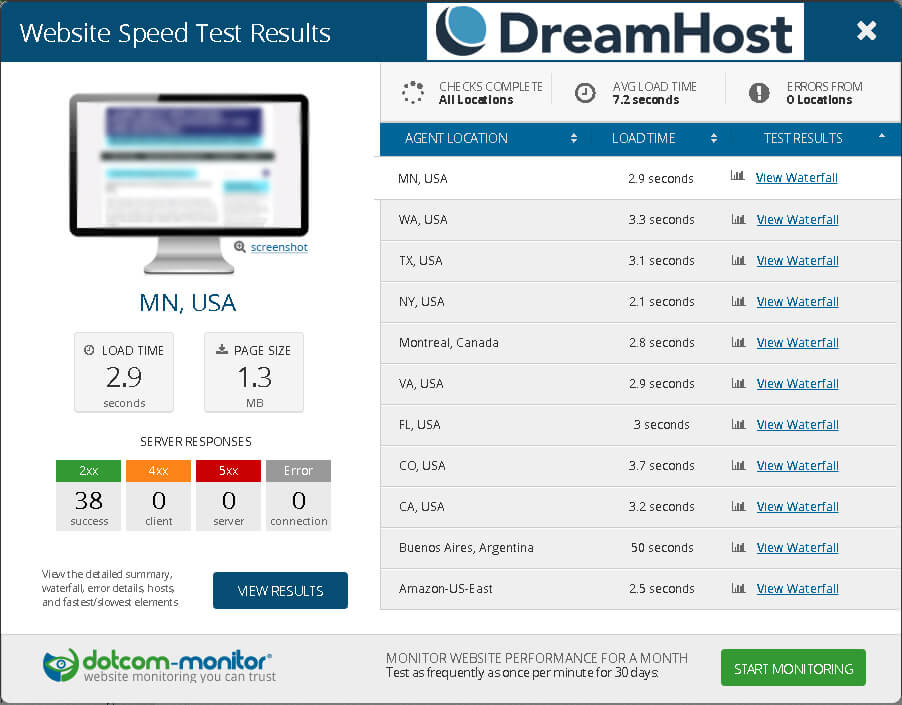
Tthe results for DreamHost are shown above and the results for HostGator are shown below. Each of these test websites on each host was tested from all of Dotcom-Monitor’s North American data center locations.
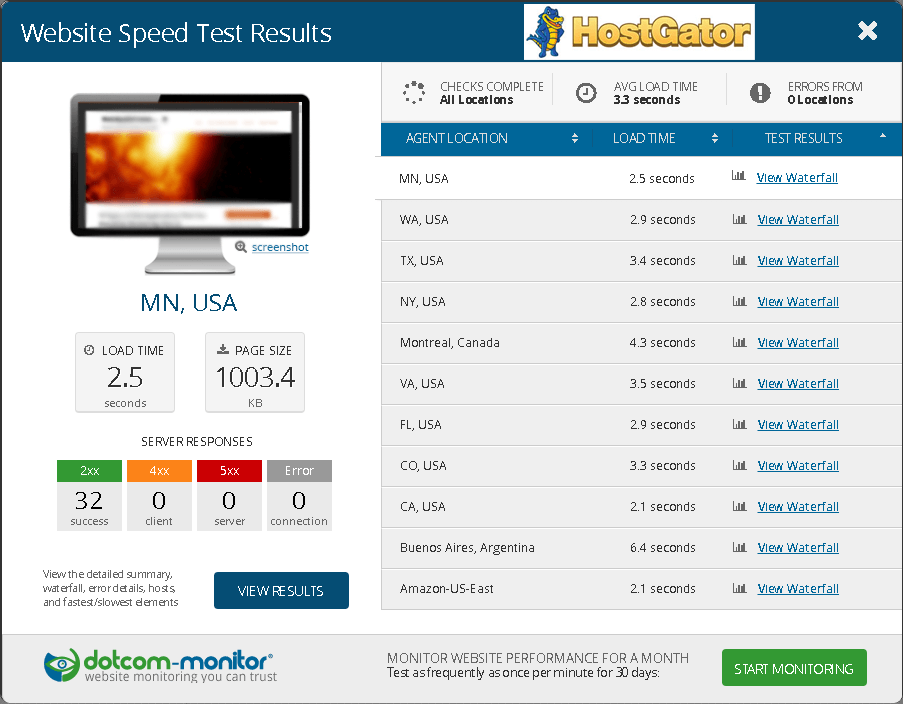
Looking at HostGator, they did quite well in this test. The site hosted on their shared servers had an average load time of 3.3 seconds. When it comes to speed testing, getting a website to load in under 3 seconds is considered the “golden rule” and what most people should be aiming for. While HostGator’s average time was 3.3 seconds, their quickest time was 2.1 seconds (from the FL, USA location) and their slowest time was 6.4 seconds (this was from Dotcom-Monitor’s Argentina location).
Moving on to DreamHost, their fastest load time was 2.1 seconds (from the NY, USA location), with their slowest load time being 50 seconds (from the Argentina location). That said, if you look at the load times across the board, they were fairly similar to HostGator in a variety of locations. In our personal real-world testing, we’ve noticed that when sites get filled with images and are more complex, DreamHost’s servers tend to struggle in comparison to HostGator’s.
The winner for website speed and server performance: HostGator, by a small margin.
If you look at the objective data from this test, it seems that DreamHost (although their average was brought down quite a bit by the Argentina test location) is fairly close to HostGator. However, this has not been our personal experience with DreamHost overall in real-world conditions.
While HostGator was fairly close to DreamHost in this test, our experience with them in terms of website speed and performance has usually been quite good, as they’re typically one of the best at managing and optimizing server resources in terms of shared web hosts.

Click Here to Visit HostGator
Uptime & Reliability: DreamHost Compared to HostGator
Whether you’re a blogger or a small business, downtime is always a bad thing when it comes to your website. Downtime can be very damaging to a blogger’s reputation while they are trying to grow their audience, and it can also be very costly to a business.
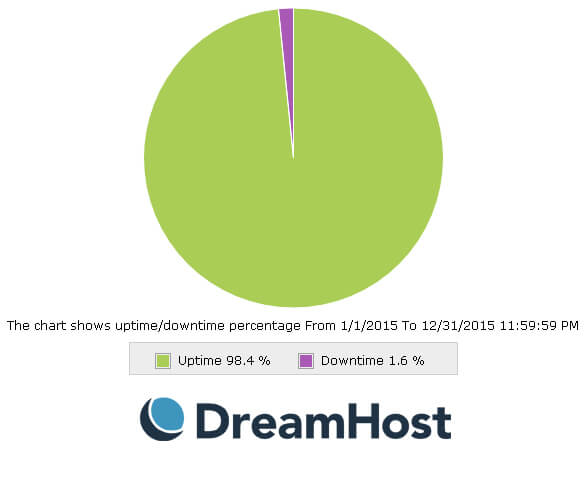
When looking for a web host, it’s important to try and find a host that has a good Service Level Agreement (SLA) that guarantees a high percentage of uptime. For example, the industry standard is 99.9%. This means that for a web server to meet the terms of the SLA, it should be online at least 99.9% of the time. Now, with that said, every host has their own SLA terms and define uptime/downtime differently. They also often have specific criteria that’s required to consider and outage as downtime. In many cases, this is designed to protect a host from abuse and sometimes to cover their backside so-to-speak. There are a lot of hosts that are more than fair though with how they handle uptime/downtime.
DreamHost has a 100% uptime SLA but only if an outage occurs, and in that situation, they will only credit you for the time that the outage occurred. So, for example, if your website was down for 30 minutes, DreamHost would credit you for 30 minutes of time. HostGator has a 99.9% uptime SLA but if they fall under that at any point in a month, they’ll credit you for the entire month of service which is one of the best SLAs around.
In order to test uptime and downtime on both hosts, we had two test sites (as mentioned earlier) that we monitored for 12 months at 3 hour intervals around the clock using Dotcom-Monitor’s service. You can see the results summarized in the images below:
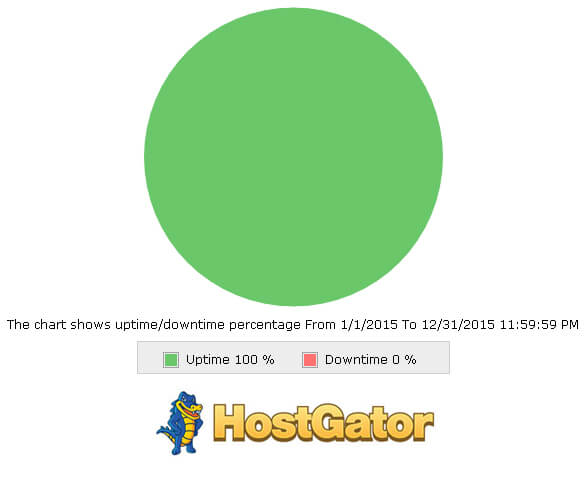
HostGator (as mention on the Bluehost vs HostGator page and the GoDaddy vs HostGator page) had an astonishing 100% uptime over 12 months. As mentioned on other comparison pages, this was with 3 hour monitoring, so that doesn’t mean that there wasn’t any downtime, it just means that none was detected in 3 hour intervals. If the interval had been 1-minute monitoring, we’er confident that there would’ve been some downtime in 12 months.
DreamHost had a pretty good rating of 98.4% uptime, which is the average of 12 months, so some months may have been more and some months may have been less. Either way, an average of 98.4% is still pretty good, although it’s below their SLA level of 100% (which is unrealistic anyway).
So who wins in the uptime & reliability category? HostGator.
It’s hard to beat 100% uptime, no matter how you look at it, and that’s what HostGator had for 12 months straight as recorded by Dotcom-Monitor. There’s no way that anything less than 100% can challenge that, even though DreamHost did have a good uptime measurement.
Click Here to Visit HostGator

Customer Support—DreamHost & HostGator
Support is a very important part of any hosting package. If you have trouble with your website and the host takes an extremely long time to answer tickets or you have to wait on chat forever, it can be extremely problematic.
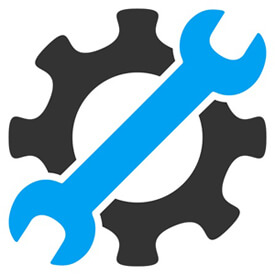
The standard for hosting support is a ticket system, however many hosts offer more than that. Premium hosts typically offer 24/7/365 telephone, chat, email and ticket support. DreamHost offers chat, email and ticket support, but does not offer telephone support. They do say that users can request a call back from a support ticket but we have not tried this—it’s clear, in our opinion, that they’re trying to steer people away from this option.
HostGator has a contact page where they make it lay out all of their contact information and even provide a toll free number for telephone support. In terms of contact options, HostGator is definitely ahead here.
We have used the DreamHost ticketing system as well as their chat and they seem to be quite slow to answer tickets and we’ve also waited on their chat for quite a while sometimes. However, we can say the same thing about HostGator too. As mentioned on other pages on this site, HostGator didn’t used to be this way and we hope that in the future they’ll return to their formerly awesome tech support ways.
The winner for support and service: HostGator.
While both DreamHost and HostGator have longer response times on tickets and chat, HostGator has more options in terms of contacting them such as telephone support, and their wait times didn’t used to be all that long, and DreamHost has always been long for as far back as we can remember. Of course, this is our opinion based on our own experience, so someone else might’ve had better service from one or the other, but we can say that even with the slow wait times on each site, we’d put HostGator slightly ahead in terms of service and support.

Click Here to Visit HostGator
User Interface/User-Friendliness—HostGator vs DreamHost
Being able to easily navigate a web host’s backend panel and other areas of their admin panel is really important when using a host. If you haven’t used cPanel before, it’s the most popular tool online for managing shared Linux web servers, and this is where DreamHost really loses in this category because they don’t use it.

We hate to really put DreamHost on blast here because they’re a solid company and web host, but their custom backend panel absolutely sucks in our opinion. They don’t use cPanel (which is very user-friendly) and instead they have this awful, convoluted, home-brew feeling backend panel that is (at least to us) incredibly confusing. We absolutely hate it and dread when we have to go into a DreamHost account in order to migrate a site or make some changes as it’s really confusing and hard to use. On top of that, we don’t feel like their wiki/support docs are very thorough so effectively you’re left to navigate their custom panel with terrible map. We can’t count the number of times that we’ve had to jump on a chat with DreamHost just to figure out how to do something simple on their custom panel, and we consider our knowledge to be expert-level when it comes to web servers and web hosting.
On the other hand HostGator uses cPanel, the industry standard, and their support documentation is awesome. It’s easy to find what you need and easy to use. A company like Bluehost is a little but more “noob-friendly,” but if you have any experience with servers at all, HostGator is very user-friendly. In fact, it’s the first company that we ever bought commercial web hosting from.
The winner for UI/UX/User-Friendliness: HostGator, and it’s not even close.

Click Here to Visit HostGator
DreamHost’s custom panel really, really sucks and it’s their biggest downfall in our opinion. Hopefully at some point they’ll update it or use cPanel, but until then HostGator is by far the clear winner in this category.
DreamHost and Host Gator: Pricing, Features, and Packages
Price is a big consideration for most people when it comes to shopping for a web host. Shared hosting is a pretty competitive marketplace with many different options. The only thing that people really need to watch out for are the renewal rates because some hosts offer a low introductory price and then when the introductory period is over, they jack up the rates at renewal time. On top of that, at lot of different coupons can be used to help lower the initial cost as well, which makes the pricing more confusing. For the sake of keeping things simple, we’ll ignore coupons in this section.
Both DreamHost and HostGator offer “unlimited everything” on their hosting plans, which really isn’t unlimited, but that’s a discussion for another page. Essentially, if you abuse it or go too far, they’ll cut you off at a certain point. However, for the sake of comparison here, they both offer unlimited bandwidth, emails, storage, etc.

DreamHost’s pricing is fairly simple, they charge $10.95/month if you choose to pay month to month, $9.95/month if you pay for an entire year, and $7.95/month if you pay for three years. We believe that their renewal pricing is the same as these as well, so there isn’t a surprise. This also includes unlimited domains as well.
HostGator offers multiple plans, but they only allow one domain on their Hatchling plan which is their cheapest plan. However, this is only $3.45/month if you sign up for three years, which is a lot less than DreamHost if you’re only planning on hosting 1 domain. If you need to move up to unlimited domains, HostGator’s Baby plan offers that for $4.95/month if you pay for 3 years up front. One level up form that is HostGator’s Business plan which is $5.95/month if you pay for 3 years up front, and is probably the most similar to DreamHost’s plan but with a few extra features such as a free VOIP phone.
When you look at all the different prices, HostGator comes out a bit ahead in terms of the annual and multi-year cost. Their pricing isn’t quite as straightforward as DreamHost, but when you do the math it’s a little better in our opinion.
Who wins on the pricing front: HostGator, by a little bit.
Click Here to Visit HostGator
DreamHost isn’t a terrible value by any means, but they’re just a little bit less competitive than HostGator in our opinion.
Who Wins the Whole Contest? DreamHost or HostGator?
In our opinion: HostGator.
Here’s why—when it comes to speed and performance, DreamHost did a little better according to the Dotcom-Monitor tests, but in almost every other category HostGator is ahead—especially in the user interface and uptime categories.
We think HostGator just puts together a less expensive and more reliable package that is MUCH more user-friendly. And, in our personal experience (not from direct testing) their servers have been a little snappier than DreamHost.
